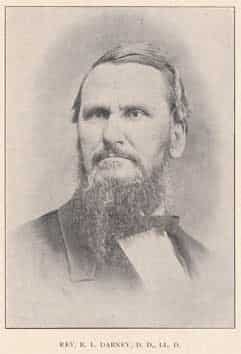This Day in Presbyterian History:
A Chaplain of the Stonewall Brigade
It was said that no danger deferred him; no sacrifices were too great for him to make.
The year was 1862. For those living in that section of Virginia now bordered as present day West Virginia, the great civil war was an imminent and daily reality of danger and disruption. It was a time of separation from family, soldiers on long distance marches, and life-threatening casualties from battle. And Stonewall Jackson always had his fair share of them. Into this scene, Abner Crump Hopkins entered.
Born in 1835 in Powhatan County, Virginia, young Abner was educated at Hampden-Sydney College, graduating in 1855 with a Bachelor of Arts degree. Whatever was used of the Holy Spirit to call him into a relationship with Jesus Christ, we do not know. But we do know that he was born again after his collegiate years. With a call to be a minister, Abner entered Union Theological Seminary in Richmond, Virginia during the years of 1857-1860. Licensed and ordained by East Hanover and Winchester Presbyteries, he took the congregation of the Presbyterian Church of Martinsburg, Virginia. It was evidently a happy ministry until Federal troops invaded the town. Leaving behind family and friends, Abner Hopkins was commissioned as a Confederate chaplain by the Second Virginia Infantry Regiment on May 3, 1862.
Right at the very beginning, Chaplain Hopkins made it his determination to share the suffering, marches, and perils of the men in the regiment. Indeed he was so successful in this determination to be faithful always in his post of duty that the officers and men of his regiment, and other units, sought him out for spiritual comfort. Opportunities to proclaim the gospel of grace came frequently from nightly prayer meetings at headquarters as well as on the Sabbath, which brought many souls into the kingdom.
On two occasions during the war, the hardships of this life and ministry produced emotional and physical breakdowns which set him apart from his military “congregation.” But after times of rest and recovery, he always returned to the military to further minister God’s Word. He was a part of the great “revival” which took place in the Southern army, especially during the latter part of the War.
After the close of the war, he returned to the civilian world as a pastor. His longest pastorate was in the Charleston area of West Virginia, where he was faithful in one congregation for forty-five years. He was known all over the South, in that he served one year as the moderator of the 1903 General Assembly of the Presbyterian Church in the United States. He died in 1911.
Further study :
The grave site of the Rev. Abner Crump Hopkins.
His diary is preserved at the Virginia Historical Society Library. The diary contains entries describing participation of the Second Virginia Infantry Regiment in the battles of the Seven Days’, Cedar Mountain, Second Bull Run, Fredericksburg, Bristoe Station, and 1862 Shenandoah Valley Campaigns.
Also on this day :
May 3, 1895 marks the birthday of Cornelius Van Til, born this day in 1895 in the Netherlands. For more on Dr. Van Til, including a photographic retrospective, click here.
Words to Live By: How important it is to pray now for future difficult situations in your family or work or congregation, so that you will be faithful to the Word of the Lord and His will when the time of those difficult situations arrive.
Through the Scriptures: Psalms 67 – 69
Through the Standards: Sanctification: its subjects, ground, agent, and effect
WCF 13:1
“They, who are once effectually called, and regenerated, having a new heart, and a new spirit created n them, are further sanctified, really and personally, through the virtue of Christ’s death and resurrection, by His Word and Spirit dwelling in them, the dominion of the whole body of sin is destroyed, and the several lusts thereof are more and more weakened and mortified; and they more and more quickened and strengthened in all saving graces, to the practice of true holiness, without which no man will see the Lord.”
WLC 75 — “What is sanctification?
A. Sanctification is a work of God’s grace, whereby they whom God has, before the foundation of the world, chosen to be holy, are in time, through the powerful operation of his Spirit applying the death and resurrection of Christ unto them, renewed in their whole man after the image of God; having the seeds of repentance unto life, and all other saving graces, put into their hearts, and those graces so stirred up, increased, and strengthened, as that they more and more die unto sin, and rise unto newness of life.”


